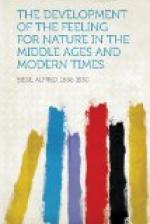Thou, Chabras, thou art the dear stream, where Jacob’s mouth gave me the first kiss. Thou, clear brook, often bearest away the passionate words of my son of Isaac ... on many a bit of wounded bark, the writing of my wounds is to be found.
The most insipid pastoral nonsense of the time was produced by the Nuremberg poets, the Pegnitz shepherds Klaj and Harsdoerfer. Their strength lay in imitating the sounds of Nature, and they were much admired. What is still more astonishing, Lohenstein’s writings were the model for thirty years, and it was the fashion for any one who wrote more simply to apologize for being unable to reach the level of so great a master! To us the bombast, artificiality, and hidden sensuality of his poetry and Hoffmannswaldan’s, are equally repulsive.
What dreary, manufactured stuff this is from Lohenstein’s Praise of Roses sung by the Sun[17]:
This is the queen of flowers and plants,
The bride of heaven, world’s treasure,
child of stars!
For whom love sighs, and I myself, the
sun, do pant,
Because her crown is golden, and her leaves
are velvet,
Her foot and stylus emerald, her brilliance
shames the ruby.
Other beings possess only single beauties,
Nature has made the rose beautiful with
all at once.
She is ashamed, and blushes
Because she sees all the other flowers
stand ashamed before her.
In Rose Love he finds the reflection of love in everything:
In whom does not Love’s spirit plant
his flame?
One sees the oil of love burn in the starry
lamps,
That pleasant light can nothing be but
love,
For which the dew from Phoebus’
veil doth fall.
Heaven loves the beauteous globe of earth,
And gazes down on her by night with thousand
eyes;
While earth to please the heaven
Doth clover, lilies, tulips in her green
hair twine,
The elm and vine stock intertwine,
The ivy circles round the almond trees,
And weeps salt tears when they are forced
apart.
And where the flowers burn with glow of
Love,
It is the rose that shews the brightest
flame,
For is the rose not of all flowers the
queen,
The wondrous beauty child of sun and earth?
Artificiality and bombast reached its highest pitch in these poets, and feeling for Nature was entirely absent.
CHAPTER IX
SYMPTOMS OF A RETURN TO NATURE
It is refreshing to find, side by side with these mummified productions, the traces of a pure national poetry flowing clear as ever, ’breaking forth from the very heart of the people, ever renewing its youth, and not misled by the fashion of the day.’[1]
The traces prove that simple primitive love for Nature was not quite dead. For instance, this of the Virgin Mary: ’Mary, she went across the heath, grass and flowers wept for grief, she did not find her son.’ And the lines in which the youth forced into the cloister asks Nature to lament with him: ’I greet you all, hill and dale, do not drive me away—grass and foliage and all the green things in the wild forest. O tree! lose your green ornaments, complain, die with me—’tis your duty.’




